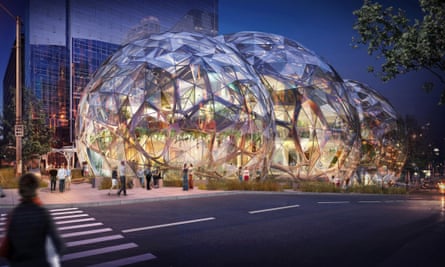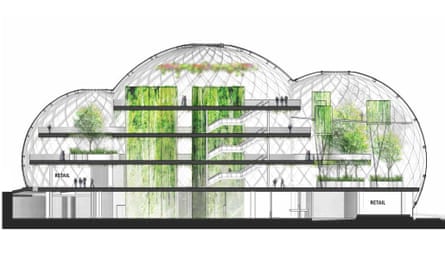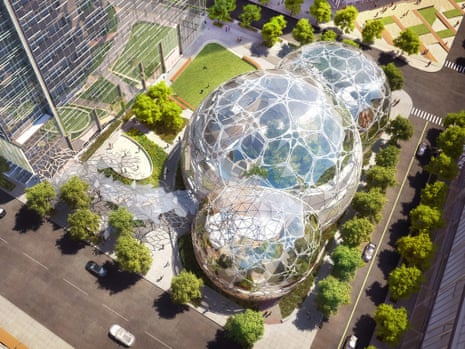Google keeps its employees happy with swimming pools, bowling alleys and a crazy golf course, while Facebook is building its workers a giant shed with a four-hectare (10-acre) park on the roof, in which they can work in the Californian sun. Now Amazon is joining the party of novelty headquarters – and perhaps hoping to stave off further strikes – by designing its new office in the form of a gigantic greenhouse.
Formed of three interconnected glass spheres, rising up to 30m tall, the complex will nestle amongst undulating grassy mounds in downtown Seattle, providing flexible workspace in a landscape of trees and vines for up to 1,800 employees.
“The generative idea is that a plant-rich environment has many positive qualities that are not often found in a typical office setting,” says the architecture group NBBJ, a global mega-firm that has built headquarters for Reebok and Boeing, and is currently working on a new Samsung HQ in Silicon Valley. “While the form of the building will be visually reminiscent of a greenhouse or conservatory, plant material will be selected for its ability to co-exist in a microclimate that also suits people."

Drawings submitted to the planning department – which gave the scheme unanimous approval last week – show four storeys of open-plan office space dotted with mature trees and intersected by circulation cores that appear to be dripping with a kind of green slime. It could be a scene from I am Legend, a post-apocalyptic vision in which nature has finally got its revenge on the tech industry.
The huddle of glass balls sit below soaring glass shafts, like an odd fungal growth on the forest floor. This little spherical utopia is conceived as the “social heart” of a vast Amazonworld, covering 3.3 million sq ft (307,000 sq m) over three city blocks, where three generic office towers, 38-storeys apiece, will house workers who prefer carpet tiles and suspended ceilings to camping out in the jungle. In total area, it is one of the single biggest development projects in the city's history.
Amazon says it is “seeking to build a neighbourhood rather than a campus”, to reflect the company's “community-focused culture”. The trio of domes will therefore be “anchored” at either end by publicly accessible retail spaces, placating the public with shops. There will also be an “off-leash dog park,” adding to the feral chic of it all.

The biospheres replace an earlier approved scheme for a squat boxy block, clad in a golden barcode skin, a slab of bland pseudo-modernism that could have been lifted from an out-of-town shopping centre. Its substitution for this mini-Eden Project is a bizarre twist in the tale. Did Amazon boss Jeff Bezos, owner of a space flight company and now commander of a drone army, suddenly realise he needed something more futuristic to fit his sci-fi portfolio?
If so, greenhouse domes are a strange choice. They may well contain “a variety of ecological zones,” and take the 1950s idea of bürolandschaft (office landscape) to a whole new level, but they already seem peculiarly anachronistic, particularly for an organisation some describe as “easily the most fascinating company on the planet”. If Bezos' balls are a vision of the future, it is a vision c1967, the year Bucky Fuller built his geodesic biosphere in Montreal – and an era where his Jetsons dream of a drone delivery swarm belongs, too.

Comments (…)
Sign in or create your Guardian account to join the discussion